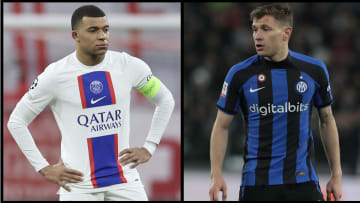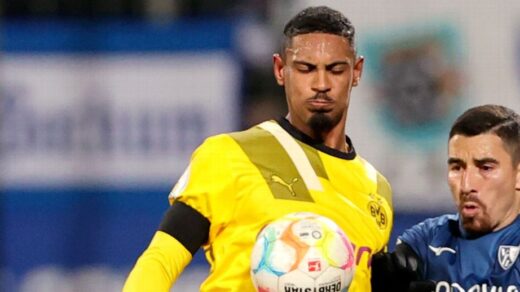There’s only one other club in the world where, if a coach had established a seven-point lead in the title race, already won a trophy while comprehensively defeating their most bitter rivals and had a Cup semifinal up next, the word “crisis” would be within a million miles of the media.
Unfortunately for Xavi Hernandez, that other club is Real Madrid — a Madrid that have suddenly closed the gap at the top of LaLiga and begun to look capable of hunting the leaders down, who look like favourites to retain their Champions League crown and who are next up for Barcelona in that Copa del Rey semi this Thursday.
In football, just as in comedy, timing is everything.
– Stream LIVE: Real Madrid vs. Barcelona, Copa del Rey, Mar. 2, 2 p.m. ET, ESPN+
– Stream on ESPN+: LaLiga, Bundesliga, more (U.S.)
It’s been a handful of weeks since Barcelona dominated Madrid in Saudi Arabia; they now look like potential victims. Elimination from European football at the hands of Manchester United, even after two classic matches, and a decreasing quality of football after that Supercopa destruction of Madrid — followed by a defeat at relegation-threatened Almeria last weekend — have the hungry critics ready to feast on the novice Catalan coach if his team is, as seems extremely feasible, beaten at the Bernabeu on Thursday.
Barcelona will not only play the first leg of this Clasico semifinal looking out of form, both physically and mentally ragged, but they’ll do so without the injured Pedri, Ousmane Dembele and, most likely Robert Lewandowski. That timing is comically bad because since Xavi took over at Camp Nou, the Clasico pendulum has decidedly swung the way of the fitter, sharper team.
The idea that this is a type of “derby” match where “form goes out the window” hasn’t been true recently. The side you expect to win across the past five Clasicos (including one friendly) since Xavi became Barcelona manager has done so.
His record, so far, is: played five, won three, lost two. Of those, last summer’s friendly in Las Vegas is by far the most expendable piece of data. Barcelona won 1-0 thanks to a wondrous goal from Raphinha, but Madrid were far behind the Catalans in their preseason fitness, were a terrific match for Barcelona for 55 minutes… and then faded. Naturally.
During the two victories Xavi’s savoured as Barca coach, Madrid have been sluggish, without question. Physical fitness, sharpness, stamina: these were the absolute key factors when Gavi and Pedri laid on a masterclass of high-tempo pressing football to win the Spanish Supercopa 3-1 in January.
The 4-0 win at the Bernabeu a year ago was, admittedly, adulterated by Carlo Ancelotti’s mistaken concept of using Luka Modric as a false centre-forward and playing a desperately risky high defensive line. It was a mistake the Italian both acknowledged and apologised for after the match. Madrid were without Karim Benzema, looked ragged from the intensive midseason physical training imposed on them by their Italian guru, Antonio Pintus, and had just been through two draining matches with PSG where they’d looked inept and played as if they were eliminated for 150 minutes of the 180-minute battle.
(In context, please note that Pintus’ methods, which leave players feeling physically punished but then increasingly indomitable, were good enough to catapult Madrid to those astonishing comeback victories against Chelsea and Manchester City. They speculate to accumulate. It’s also worth noting that Madrid were in an identical post-Pintus physical punishment in January when they looked leaden-legged in that Supercup final defeat.)
Make no mistake: in each of those wins, Xavi read his cards brilliantly and his specific match philosophies were nothing short of perfect. But in matches like the Clasico, any significant physical/athletic advantage is massively magnified and hands one of the two teams an almost unmissable victory opportunity. One that Madrid are very likely to enjoy this week.
In the two Clasicos Xavi has lost as coach, Los Blancos have thrived on power, pace, pressing and counter-attacks that left their Blaugrana rivals puffing and panting in their wake. Fede Valverde, Karim Benzema and Vinicius were the principal tormentors. The evidence — supported by Man United showing over the past fortnight how Barcelona can be hurt by pace and an intense press — suggests that the league leaders will do well to return to Camp Nou next month with a respectable chance of winning on aggregate.
But something that seems important and ignored all at once is the context within which Xavi is having to work.
Even given his coaching successes and trophies won in Qatar, this is his first full season working amid the European elite, with all the demands, pressure, focus and criticism such jobs inevitably bring. During this process, his resources have either been reduced or hampered not only by his club’s massive €1 billion debt, but by the hawkish strictness of LaLiga’s Financial Fair Play.
Via a series of byzantine asset-mortgaging last summer, Barcelona added significant playing strength to a failing squad, though the club’s accountants have also grasped gratefully at the chance to cut costs during the season. Forward Antoine Griezmann, playing thrillingly for Atleti, was offloaded at a knock-down loss. Veteran defender Gerard Pique abruptly retired, while Memphis Depay and Hector Bellerin also left. Yet last week it was announced that LaLiga believe Xavi’s employers need to shed at least a further €200 million of costs, or increase revenue by a phenomenal and proportionately linked degree. Another Frenkie De Jong style-saga, or three, looms in the summer, by which I mean predatory clubs might quite rightly realize it’s a buyer’s market and that they have a chance to wrench away Barcelona’s best talents. Meanwhile, as Xavi tries to exert his influence and keep taking the playing side of things forward from the wasteland he inherited, trying to teach his stars while learning from missteps himself, two of his most prodigious talents don’t quite seem to know what their future holds. Gavi’s registration as a first-team player needed to be confirmed via a legal action in court because LaLiga opposed its legitimacy, while Alex Balde, whose contract should have been extended and vastly increased, is another victim of the disparity between what Barcelona think they can do and what LaLiga tells them they are allowed to do. It’s a deeply unsettling situation for the coach, the players and others who think that their contracts, too, are imminently due to be re-negotiated. Nobody’s really talking about it or bringing the stark truth into focus, but the club are also not only about to lose Camp Nou — one of their great money-generating assets — for a couple of seasons, they are going to pour money into it while losing millions via their temporary move to the Olympic Stadium on Montjuic Hill from next season on. What lies ahead for Xavi & Co. is a poorer playing surface, a poorer atmosphere, smaller crowds, a pitch surrounded by a running track and far less advanced matchday facilities while the main stadium, at a cost of several hundred million Euros, is renovated. How long this takes as opposed to how long it’s estimated to take is fertile territory for cynics. Meanwhile, a scandal has erupted. No, not the one where the local police raided the home and offices of the former club President Josep Maria Bartomeu — the one where the national tax authorities appear to have discovered two decades of payments for “refereeing assessments and advice” paid to a man who was a Vice President of the Spanish FA’s refereeing committee. A whole hurricane of bluster and protestations of innocence has followed from the club, but anyone who says that Barcelona’s image hasn’t been horrifically tarnished is living on another planet. Criminal investigations are underway, and anyone who imagines that all this isn’t an absolutely massive drain on the energy, confidence, attention and durability of Xavi, his staff and the playing squad is equally deluded. Yet some simple facts remain. Just 46 games into reign of any Barcelona coach in LaLiga, only Luis Enrique’s Treble-winning squad had a better points record than Xavi. Oh, and the point gap between then was precisely three. One win. In their first 46 LaLiga matches, Xavi and Pep Guardiola had an identical point total: 109 from 34 wins, seven draws and five defeats. That’s right: the very same Guardiola who had the best versions of Lionel Messi, Samuel Eto’o, Xavi, Andres Iniesta, Carles Puyol, Pique and Sergio Busquets at his disposal. Guardiola’s first 46 matches at Barcelona, as with Luis Enrique, were building toward a historic Treble in 2009. Today, Xavi is adapting the brand of football played under Guardiola; he’s not abandoning it, but adapting it, and often dramatically. However, his central ideas of pressing, possession, position and precision are generally working well. Especially while he himself is developing, reviewing, learning and rolling with the punches. To do this successfully in his first full season in LaLiga, against a background of almost anarchic chaos is hugely impressive. Only the myopic, biased or incompetent can fail to acknowledge that. Should his team be beaten on Thursday, it’ll neither be a big surprise nor anything approaching a disaster. Yet without fail, the Spanish football media will pounce on the chance to yell that there’s a crisis, to put Xavi’s ideas in the dock and to wholly ignore that, against a chaotic and unsettling background, something extremely interesting and potentially successful is being built at Barcelona.



